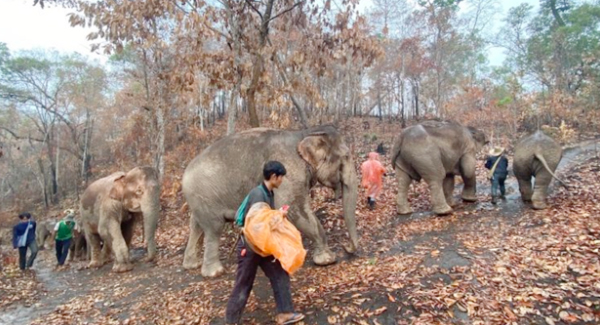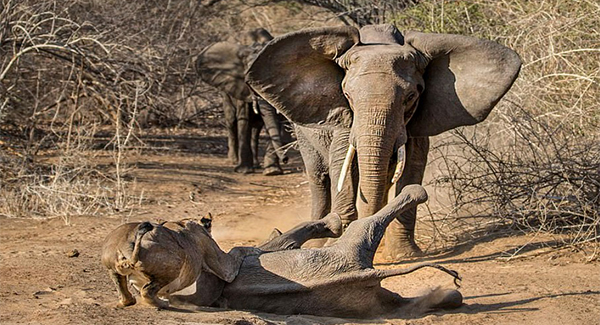Elephant’s Massive Migration Return Home After The Number Of Tourists Dwindles
In March 2020, a massive migration began when an international travel brought Thailand’s tourism industry to a sudden halt. Elephant camps, which use more than 2,700 captive elephants for controversial ᴛʀᴇᴋᴋɪɴɢ, ʙᴀᴛʜɪɴɢ and riding tours, were hit by the double whammy of a lack of tourist revenue and relentless gargantuan food bills. Dozens of camps shut down, and elephants and staff were laid off in their thousands. The elephants have been in captivity, some of them for many years, and living in the wild to fend for themselves is not possible. Added to which, the farmers are now burning their land to make way for new crop growth, so their natural habitat is severely ᴄᴏᴍᴘʀᴏᴍɪsᴇᴅ and in many cases, forests have disappeared completely in the short term.
The elephants have been in captivity, some of them for many years, and living in the wild to fend for themselves is not possible. Added to which, the farmers are now burning their land to make way for new crop growth, so their natural habitat is severely ᴄᴏᴍᴘʀᴏᴍɪsᴇᴅ and in many cases, forests have disappeared completely in the short term.
The organization Save Elephant Foundation (SEF), fears that the current crisis will lead to ᴍɪsᴛʀᴇᴀᴛᴍᴇɴᴛ of the elephants by their owners in a desperate attempt to make the animals earn more money. These may include logging over the border in Myanmar street begging, or being sold to zoos.
Faced with an uncertain future and looming food shortages in tourism hubs, hundreds of elephants and their keepers trekked back to their native villages, where cash-strapped owners hoped the elephants could forage naturally in the forest until tourism returned. Many of those elephants were leased from owners who live in remote rural locations, where the tradition of keeping elephants goes back generations.
All the elephants that were involved in trekking and other tourist activities now face a very bleak future unless immediate action is taken without delay. Save Elephant Foundation (SEF), is now working on introducing sustainable farming programs to help the many elephants.
There are hundreds of elephants trekking many miles with their mahouts (elephant carers), who have little or no food to sustain them on their journey. Once they arrive back in their native village, there is little or no money to feed them. Lek accompanied a group on the arduous walk home to their Karen villages in northwest Thailand. Their five-day journey of more than 100 kilometers (60 miles) took them across hillsides charred by seasonal fires and through forests where they slept at night. Upon arrival, the elephants and their keepers were warmly welcomed; villagers had prepared fruit for the animals and sang songs in celebration.
Lek accompanied a group on the arduous walk home to their Karen villages in northwest Thailand. Their five-day journey of more than 100 kilometers (60 miles) took them across hillsides charred by seasonal fires and through forests where they slept at night. Upon arrival, the elephants and their keepers were warmly welcomed; villagers had prepared fruit for the animals and sang songs in celebration.




